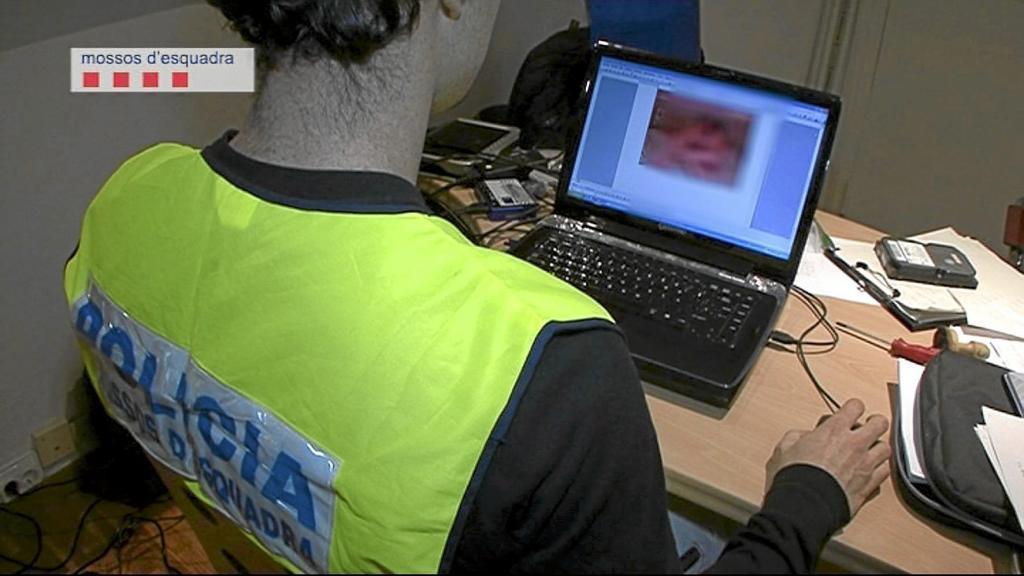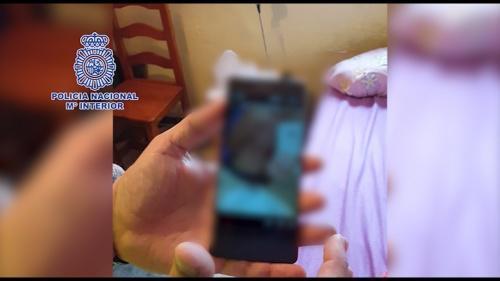The dark side of the 'Instagram generation': the 'theft' of photos to use them as 'bait' on porn websites is growing
It has gone from being a latent threat, which stalks those who tend to expose themselves on social networks, to becoming a real risk that mainly affects adolescents, the most exposed to this type of evil use of your privacy. The Barcelona Computer Crime Prosecutor's Office has warned that since last year, coinciding with the confinement due to the covid pandemic, complaints to the police have skyrocketed for the capture of photos of adolescents, mainly girls between 12 and 18 years of age. , they hang on their social networks to use them as a claim in internet payment pornographic portals.
Specifically, between 10 and 15 monthly complaints are received for the use of these photographs to become 'bait' for these sex websites. Parents are the ones who go to the police when they find that the images of their daughters promote these pages, in some cases taking advantage of the "popularity" that these adolescents have on the internet by being considered 'influencers'. And it is that they benefit from the fact that the victims post photos in bikinis or scantily clad to profit from the objectification of the female body for a public that will always demand access to this privacy. It is the danger of social networks.
However, despite the fact that the complaint reaches the Prosecutor's Office, it is not always considered a crime. The pages that use the images of the adolescents, some of them minors, download them from the social networks of the victims and they have posted them freely, thereby exposing their privacy to the public. This situation does not have a clear criminal framework since it would not be a crime of disseminating pornography since adult websites are allowed and, in most cases. the photos of the girls do not appear in them since they are only used as a claim to access.
Protected photos
Although criminal action is almost ruled out, the fact that photos are 'stolen' to advertise adult pornographic portals opens the door for the parents of the minors affected to file complaints civil to the pages for the benefit they get from the fraudulent use of the images for promotion. You can also file administrative claims for the misuse of personal data before the corresponding agencies that can end in economic sanctions.
The Barcelona Computer Crime Prosecutor, Roberto Valverde, considers that the increase in this type of complaints is due to the greater use of the Internet during confinement, but also due to the overexposure of adolescents on social networks, a trend that has been increasing in recent years. Precisely, for years the organization Parents 2.0, within the talks to families in educational centers about Internet Safety for minors, has been warning of this type of risk related to social networks, such as the 'theft' of photographs since It is a very simple practice to do technically.

More child pornography due to confinement
The Computer Crime Prosecutor's Office also indicates that in recent months crimes related to child pornography in Spain have tripled. Last year in the province of Barcelona, 61 criminal proceedings were opened for this type of practice, which represents an increase of 169% compared to 2019 when there were 36, while the harassment of minors through telecommunications almost doubled. Investigations for discovery and disclosure of secrets when accessing a private email account, messaging applications or mobile phone have also gone from 7 in 2018 to 55 in 2020.
According to the report of the Prosecutor's Office, "a large part of this increase is due" to bringing accusations from the courts of violence against women for "non-consensual access to the messaging and emails" of the victim by an accused of abuse . Despite the fact that since last July both incitement to eating disorders and induction of self-harm were classified as a crime, with the Law for the Comprehensive Protection of Children and Adolescents, the Public Ministry did not carry out any investigation last year into the Internet portals that advocate these practices that have most affected adolescents and young people during confinement.
However, with the pandemic, due to confinement and teleworking, computer scams have grown. 33,522 police complaints were made, although only 2% reached the court because the lack of an unknown author prevented them from being prosecuted. The most common scams are related to the purchase and sale of items over the internet, although investment fraud with cryptocurrencies or through the impersonation of supplier companies, in many cases of public administrations, is also on the increase. In fact, since 2019 justice has been investigating a digital scam that has affected around fifty Catalan town halls, by impersonating the account numbers of regular municipal providers.
Catalonia, leader in cybercrime
Last year, State security forces and bodies registered 287,963 allegedly criminal acts related to information and communication technologies, representing an increase of 31 .9 percent compared to 2019. More than 38,000 were clarified and there are 11,280 investigated or detained related to these procedures. The community with the most cybercrimes was Catalonia, with almost 48,800 crimes, slightly higher than Madrid, while Andalusia and Valencia were further away. Barcelona is the Catalan province with the most complaints, 35,708, followed by Girona, 5,376, Tarragona with 4,683 and Lleida with 3,027.
The Report on Cybercrime from the Ministry of the Interior indicates that last year's growth confirms that cybercrime is progressively increasing its proportional weight within crime in Spain as a whole. In 2016, the more than 92,000 incidents detected accounted for 4.6% of all crimes, while the 288,000 reported in 2020 represented 16.3%. Of the total known cybercrimes, 89.6 percent (257,907) were computer fraud (scams). Threats and coercion committed over the Internet followed a long way behind (14,066 cases), representing 4.9%.
According to Interior, the profile of the cybercriminal is a man (73.3% of those arrested or investigated), between 26 and 40 years old and of Spanish nationality, allegedly involved in the commission of computer fraud, threats and coercion and crimes sexual. Last year, 861 cybersecurity incidents in critical infrastructures were also registered, 5.2% more than the previous year, mainly in the tax and financial sectors (52.5%), followed by transportation (24.08%) and energy (14.05%).
According to the criteria of
The Trust ProjectKnow moreA particle accelerator that curesThe 70 children of the "bell of the brave" of 'Madrid' proton therapy to which Catalonia did not want to send its little ones with cancer...CataloniaThe Andalusian nurses pointed out by separatism: "We come to support health, not to invade Catalonia"EventsThe Boixos Nois attack a bar of ultras of Espanyol in retaliation for an assault by Benfica fans


